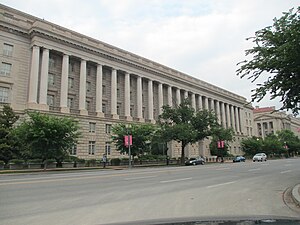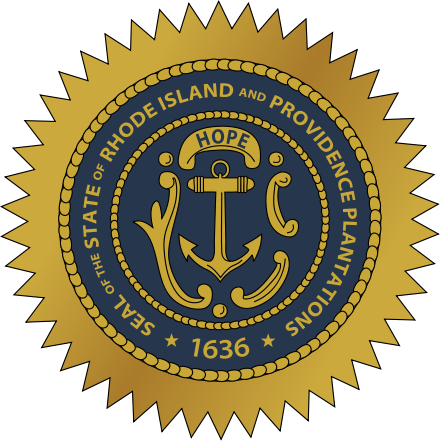Nonprofit regulation in Rhode Island
This article does not contain the most recently published data on this subject. If you would like to help our coverage grow, consider donating to Ballotpedia.
| Civil Liberties Policy |
|---|

|
| Nonprofit regulation |
| Privacy Policy Project |
| State information |
Nonprofit regulation in Rhode Island involves a complex set of rules that govern nonprofit organizations and charitable giving throughout the state. Major issues surrounding nonprofit regulation nationwide include the following:
- contribution limits,
- donor disclosure, and
- the redefinition of issue advocacy.
Rhode Island is one of 39 states that require charitable organizations, and those intending to solicit on their behalf, to register with the state in order to solicit contributions, whether they are a Rhode Island organization or based out-of-state. In Rhode Island a number of groups and organizations are exempt from registration.[1]
Rhode Island is one of 32 states that allows registrants to use either the Unified Registration Statement (URS) or the state registration form.[2] Only seven states requiring registration do not accept the URS.
- Note: The following is not a how-to guide in managing an organization's registration and reporting requirements, but rather an attempt to share information about the relative degree of regulation governing nonprofit charitable activity at the individual state level. The information on this page was last updated in early 2015.
Background
According to the Foundation Center, there are over 1.5 million nonprofit organizations in the United States.[5] Section 501 of the U.S. tax code outlines which types of nonprofit organizations may be granted tax exempt status by the Internal Revenue Service. The section of this code that provides for exemption is section 501(a), which states that organizations are exempt from some federal income taxes if they fall under sections 501(c) or 501(d), or under section 401(a).[6]
Organizations classified as 501(c)(3) are nonprofit charitable, religious and educational organizations. These include organizations like the Red Cross and Habitat for Humanity as well as the American Civil Liberties Union and the Lucy Burns Institute, which provide, as defined in the federal code, “instruction of the public on subjects useful to the individual and beneficial to the community.”[7] Organizations granted 501(c)(4) status are political education organizations, and can engage in political lobbying. This includes donations to political committees that support or oppose ballot measures, bond issues, recalls or referenda. 501(c)(4) organizations can thus engage in issue advocacy, but they are not allowed to expressly advocate for the election or defeat of a particular candidate.
While the Internal Revenue Service designates eligible nonprofit charitable organizations with a federal tax exempt status, individual states require their own level of regulation and reporting, particularly when organizations attempt to solicit fundraising contributions. The amount of regulation required differs by state, as does the degree to which state regulations protect the privacy of individual donors. Three states, for instance, require annual copies of IRS Form 990 (schedule B), which lists individual contributors who contribute over a specified amount. Research shows that attempts to make contributions more transparent has an unintended negative effect on the number of contributors who give, as well as the amount.[4]
Governing agencies
The Rhode Island Department of Business Regulation is the agency in the state that oversees rules governing donor solicitation and registration.
See law: Rhode Island General Laws, sections 5-53.1-1 through 5-53.1-18
Registration requirements
Any nonprofit group or organization located in Rhode Island, unless exempt, must register with the Rhode Island Department of Business Regulation. Any non-exempt nonprofit, in any state, intending to solicit in Rhode Island must also register, along with anyone intending to solicit in Rhode Island on behalf of a nonprofit. Non-exempt nonprofits might include traditional charitable organizations like the Red Cross or Habitat for Humanity, educational or policy organizations like the American Civil Liberties Union, or issue advocacy groups like the League of Conservation Voters.
Exemptions
A number of groups are exempt from registering in Rhode Island. The following are exempt from registering:[1]
- Any group that receives less than $25,000 and has no professional fundraisers
- Religious groups
- Educational organizations
- Appeals for named individuals
- Membership organizations
- Foundations created for the benefit of religious groups, educational organizations, nonprofit hospitals and public libraries
- Charitable hospitals
- Homes for the aged, orphans, etc.
- Individuals soliciting solely from corporations, foundations or government
- Veterans' groups
- Public libraries
- Rhode Island historical societies
- Nonprofit public art museums
- Grange organizations
- Volunteer fire and rescue associations
- Land trusts organized under state law
Procedures
Nonprofits registering in Rhode Island can use either the Unified Registration Statement (URS) form or the state form.[1]
Documents
The following documents are required along with your registration form:[1]
- Electronic copy of IRS determination letter
- Copies of any fundraiser contracts
- Organizations receiving less than $500,000 must include a copy of IRS Form 990 or a financial statement for the preceding year. Organizations receiving more than $500,000 must file an audited financial statement prepared by a certified public accountant and do not need to file a copy of their IRS Form 990.
Signature and fee
Two authorized signatures, one of whom must be a director or trustee, are required. Notarization is not necessary.
The registration fee is $90.[1]
Filing procedures
Registration materials must be submitted on a CD-ROM. Paper filing is no longer allowed. CD-ROM submissions may be mailed to:[1]
State of Rhode Island
Department of Business Regulation
Charitable Origination Section
1511 Pontiac Avenue, John O. Pastore Complex Bldg 69-1
Cranston, RI 02920
Renewal
Initial registration expires one year after issued and must be renewed 30 days prior to expiration. The renewal process is the same as initial registration. Extensions for providing financial information exist, but not for renewals. To apply for an extensions, write a request letter to the Department of Business Regulation and submit copy of IRS Form 8868].[1]
Financial reporting
All annual financial reporting requirements are satisfied in the renewal process.[1]
Recent news
This section links to a Google news search for the term "Rhode + Island + donor + privacy"
See also
External links
Footnotes
- ↑ 1.0 1.1 1.2 1.3 1.4 1.5 1.6 1.7 Fishman, S. & Barrett, R. (2012). Nonprofit Fundraising Registration: The 50 State Guide. NOLO.
- ↑ "Multistate Filing Form," accessed December 17, 2014
- ↑ Guidestar, Fundraising: What Laws Apply?" accessed February 18, 2015
- ↑ 4.0 4.1 London School of Economics, "Campaign finance laws that make small donations public may lead to fewer people contributing and to smaller donations," January 7, 2015
- ↑ Foundation Center, "Frequently Asked Questions," accessed December 17, 2014
- ↑ Cornell University Law School, "26 U.S. Code § 501 - Exemption from tax on corporations, certain trusts, etc," accessed January 13, 2015
- ↑ Cornell University Law School, "26 CFR 1.501(c)(3)-1 - Organizations organized and operated for religious, charitable, scientific, testing for public safety, literary, or educational purposes, or for the prevention of cruelty to children or animals," accessed January 13, 2014


